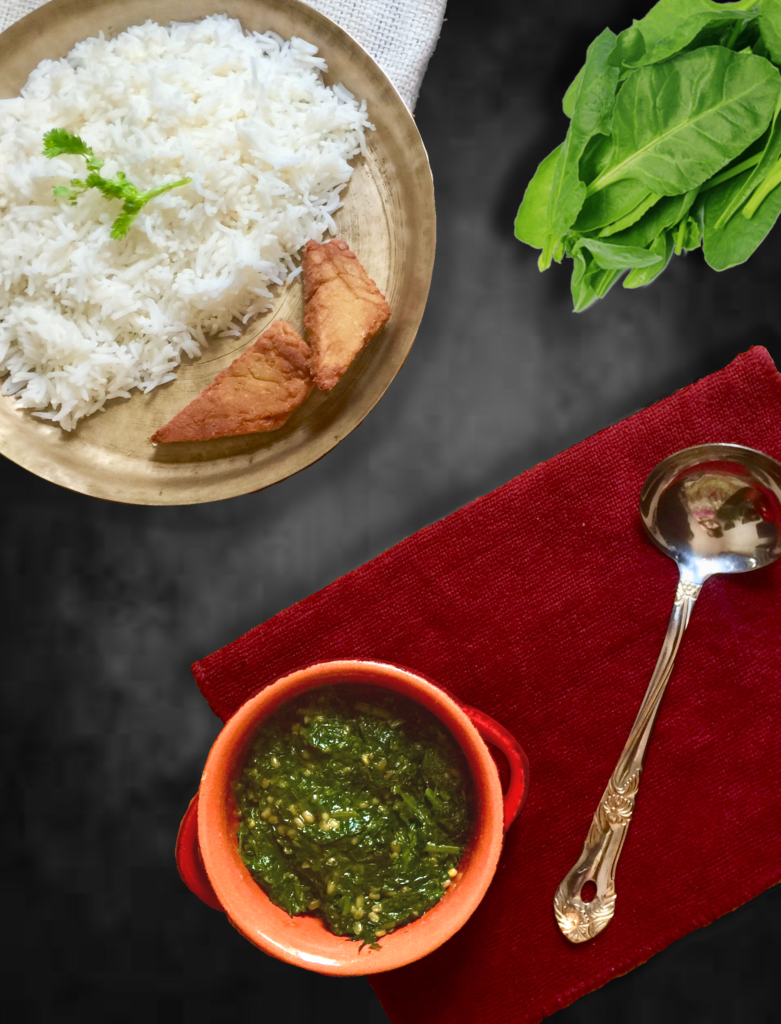Translated from the Bengali by Upama Mukherjee
Palong shaker Shukto: Mung dal and spinach curry with ginger
The wide open space right outside our house was known to us as the Bahirbari. The large beautifully patterned and carved wooden bench sitting on the veranda that blended into the yard was my favorite. It was also where people from all surrounding houses would spend their leisure time. The balcony acted as a headquarter for the neighborhood.
Daily menus, harvest woes, or the news of someone coming up with a new design for their loom or having woven a new pattern of saree—one could get well acquainted with all such happenings of our neighborhood simply by loitering on that balcony. Usually, after lunch, the old aunts and grandmothers from the neighboring households gathered there, cutting on their midday slumbers.
Twin bay leaf trees stood at one corner. Nowhere else did I see such bright green young bay leaves.
Those two trees were not ours. Those belonged to Golenur Dadi, our next-door neighbor. Boundary walls did not come into existence.
And the two houses stood so close to each other that even the trees of the outer house could not be separated based on their owners. In fact, in those days, the entire neighborhood shared a single yard.
Another attraction of this outhouse was the ‘factory’. There were innumerable hand-run looms. Since morning as they started working, ceaseless CLIT CLATTing filled up the air; became an inseparable part of our days. If the factory was closed for some reason, the silence seemed odd, strangely out of sync.
I used to sit on the balcony and watch the weavers—entering the factory with food wrapped in cotton towels, singing their hearts out working at their looms weaving sarees, and sometimes sitting in groups and eating rice in Golenur Dadi’s yard.
I, a passive witness to their laughter, excited meal-time chatters, and sharing one betel leaf among themselves, somehow grew very close, all too familiar and one with them and their moments of joy.
Meanwhile, preparations for lunch at the inner house were almost over.
My pretend-play set up for curries, fish, and meat spilled into Golenur Dadi’s yard as Maa called out—it was time for a bath. Some torn green bay leaves from the twin tree, a bunch of cedar fruits, a few pebbles, and a fistful of soil tumbled out of the small earthen pots.
I would wrap up, shower, and go sit in granny’s kitchen.
Granny would be waiting for the seasonings in the pan to get roasted enough with a plate of chopped spinach in her hand. When the cumin and dry chilies would slightly blacken, she would add the mung dal and give it a stir.
Watching me getting impatient, she would ask, “Didi, what were you cooking today? You didn’t bring some for me to eat!”
Only she used to taste what I made for my cooking game.
Sensing my embarrassment at the slip, she said, “Today you cook the spinach for me.”
I took small steps and stood right at her back.
“Should I put the spinach into the pan now, didi?” she would pretend to take permission from me.
She would add the chopped spinach into the pan, add salt and turmeric, and stir a little.
The spinach released juice and turned greener. Granny would say, “Want to cook?” When I shook my head, she would say, “You tell me, and I’ll do as you say.”
I would say, “Put some more turmeric. It seems less.”
Granny then added a pinch of turmeric and said, “If you add a little turmeric to spinach, the color gets better, didi.”
Then a few green chilies were added to the pan. Thakuma used to dip the green chilies in the green sap and smack those with the spud.
“Oh, granny, won’t it get too spicy?”
She told me, “If you break the tip of chilies like this, it doesn’t get spicy, but leaves a scent.”
“Didi, shall we cover it a little?” As I nodded my head in agreement, she would say, “Spinach should be covered less, otherwise its color gets lost.”
I started whining by then. “I will not eat the chital fish. It’s too boney!” She cajoled me, pressing my cheek a little, “I’ve cooked them grated for you, didi. How about that?”
She would then open the lid of the pan and add a bit of ginger, finely pasted as sandalwood and say, “You tell Dadu to get his piri.”
Standing as it is, close to granny’s back I would shout, “Oh Dadu, place the piri on the porch.”
Granny would sprinkle a little sugar and the green shukto of spinach was ready.
When I was just about to burn my fingers in hot spinach-shukto sitting beside grandpa on the red balcony, he would stop me, “Wait for a second, Ginni, let me, let me cool it for you, and then eat.”
Soon, as he blew on it, the spinach-shukto got cooled, and granny served chital kora on my plate. But there was a condition, that shukto must be finished first, then I could have the grated fish.
When I took the first mouthful of green rice mixed with the spinach-shukto, a weaver in the outdoor factory would croon.
I haven’t seen her even once—
My neighbor,
Who lives in the land of Arshinagar
next to my house.
The above is an excerpt from Smriti Bhadra’s book Roshui Ghorer Royak (Days In The Kitchen), first published in 2021. The book is a collection of eclectic recipes from the author’s bygone days. Not merely a book of recipes with meticulous instructions and information, it presents itself as a food memoir wherein the author reminisces about her life through myriad food items that are intrinsically entwined with her cultural identity. This is the fifth part of the series of the translated book. To read the first, second, third, fourth, and fifth parts, click on the following links:
To read the following parts, keep a lookout at The Antonym magazine’s website.
Also, read three Italian poems, written by Diego Valeri, translated into English by Laura Valeri, and published in The Antonym:
Follow The Antonym’s Facebook page and Instagram account for more content and exciting updates.




























0 Comments